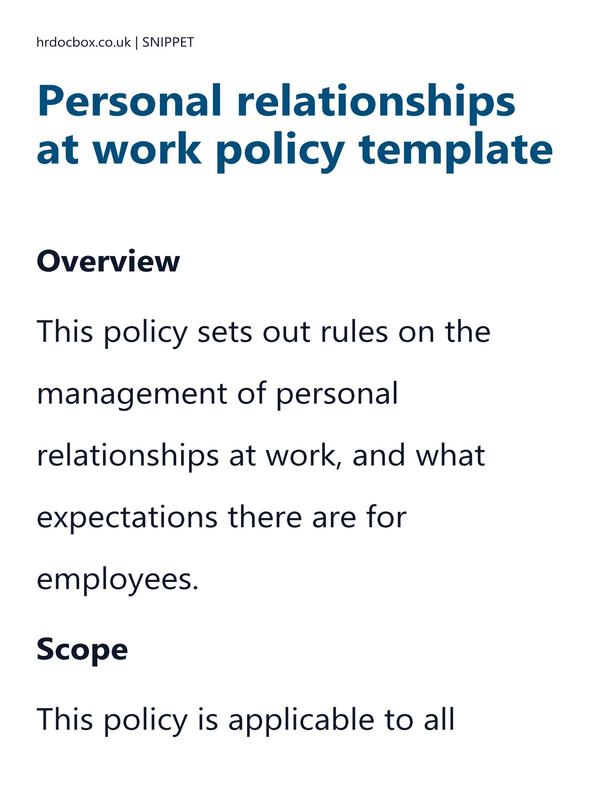Personal relationships at work policy template


Personal relationships at work policy template setting expectations and managing conflicts of interest.
Use this model personal relationships at work policy to set out rules on the management of personal relationships at work, and what expectations there are for employees.
- Includes Personal relationships at work policy template, plus 12 months’ access with all updates provided free of charge and notified to you.
- UK-specific accuracy.
- 620 words over 2 pages.
- Last updated 28/01/2026.
- Format: Word / plain text / email.
- Delivery: Instant download after purchase (no physical item).
- Access: Download link shown here after checkout.
- This Personal relationships at work policy template will SAVE you up to 1 hour 30 mins drafting & research. Save cost. Reduce risk.
Personal relationships at work policy
1 Overview
1.1 This policy sets out rules on the management of personal relationships at work, and what expectations there are for employees.
2 Scope
2.1 This policy is applicable to all employees of [company name].
3 General principles
3.1 The Company recognises that employees who work together may form personal friendships and, in some cases, close personal relationships. The Company does not, as a general rule, wish to interfere with such personal friendships and relationships. However, it must also ensure that employees continue to behave in an appropriate, professional and responsible manner at work and that they continue to fulfil their job duties both diligently and effectively. These rules are therefore aimed at striking a balance between your right to a private life and the Company's right to protect its business interests.
3.2 The following rules apply to employees embarking on close personal relationships at work, whether the relationship is with a fellow worker, client, customer, supplier or contractor:
-
you must not allow your relationship to influence your conduct at work. Intimate behaviour during normal working hours or on Company or client premises is prohibited. This includes holding hands, other close physical contact, discussions of
This is a 30% preview of the Personal relationships at work policy template. For instant full access, purchase this item or a parent bundle.
Personal relationships at work policy template purpose
Having individuals who are involved in relationships working alongside each can present legal and practical concerns for employers.
For example, the real or perceived risk of a conflict of interest, confidentiality issues and a risk of disruption, or worse, possible legal claims if the relationship were to break down.
Practical application of a Personal relationships at work policy template
- Issue the Personal relationships at work policy template during onboarding / after changes / planned refresher.
- Send it to appropriate internal recipients such as employees, workers, contractors etc. and request confirmation that is has been read and understood.
Frequently Asked Questions about a Personal relationships at work policy template
Frequently Asked Questions about a Personal relationships at work policy template
-
Can I use the Personal relationships at work policy template in my small business?
Yes. The Personal relationships at work policy template is designed to be flexible and suitable for organisations of all sizes, including small businesses and charities. It follows UK employment law best practice, so even if you don't have an in-house HR team, you can confidently apply it.
-
Is the Personal relationships at work policy template compliant with 2026 UK employment law?
Absolutely. Like the Personal relationships at work policy template, all of our templates are drafted with the latest ACAS guidance and UK employment legislation in mind. We review and update them regularly, so you can be confident they remain compliant.
-
Can I customise the Personal relationships at work policy template for my organisation?
Yes, we highlight the areas of the Personal relationships at work policy template that you need to update with your own details, and where you need to make decisions to suit your situation. This saves you time and ensures that you meet best practice.
-
Do I get instant access to the Personal relationships at work policy template?
Yes. Once purchased, you'll be able to download the Personal relationships at work policy template instantly. Templates are provided in editable Word or Excel format so you can customise them easily, and in PDF format for easy sharing.
-
What if I need more help, not just a Personal relationships at work policy template?
If you're looking for broader support, we also offer toolkits and library bundles that include the Personal relationships at work policy template, along with other HR templates and policies for fully managing your situation. These may be more cost-effective if you need deeper advice.
-
Why should I use this Personal relationships at work policy template, and not AI to generate it?
The risk of using a free AI-generated template 'without review' includes your legal exposure, missing context, and no awareness of the wider process, whereas purchasing the Personal relationships at work policy template from us mitigates that risk.
